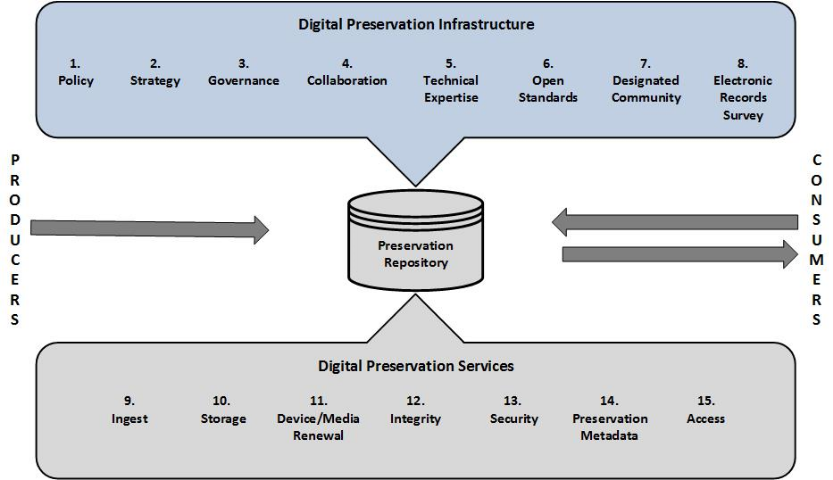Difference between revisions of "DPCMM (Digital Preservation Capability Maturity Model)"
m |
Prwheatley (talk | contribs) m (Prwheatley moved page Digital Preservation Capability Maturity Model (DPCMM) to DPCMM (Digital Preservation Capability Maturity Model)) |
||
| (5 intermediate revisions by 2 users not shown) | |||
| Line 1: | Line 1: | ||
| − | + | {{Infobox tool | |
| − | |||
| − | {{ | ||
|purpose=Maturity / gap analysis model for digital preservation | |purpose=Maturity / gap analysis model for digital preservation | ||
| − | |||
|homepage=http://www.securelyrooted.com/dpcmm | |homepage=http://www.securelyrooted.com/dpcmm | ||
| − | |||
|platforms=Web/modelling tool | |platforms=Web/modelling tool | ||
| + | |function=Organisational Audit, Planning | ||
}} | }} | ||
| − | <!-- | + | {{Infobox tool details}} |
| + | == Description == | ||
| + | <!-- Describe the what the tool does, focusing on it's digital preservation value. Keep it factual. --> | ||
| − | + | The DPCMM "organizes the digital preservation requirements of the ISO Standards into fifteen components with metrics to assess maturity. The model is a tool for charting the evolution from disorganized and undisciplined management of electronic records, or the lack of a systematic digital continuity approach, into increasingly mature stages of digital preservation capability." | |
| − | |||
| − | |||
| − | |||
| − | |||
| − | + | Based closely on the OAIS Reference Model, DPCMM is a useful tool for preservation planning and capability assessment for those looking for a holistic overview of their digital preservation activities. An assessment against the model can help with identifying gaps and priorities for development. It may also be used as a tool for those preparing for an ISO 16363 audit. | |
| − | |||
| − | |||
| − | + | [[File:Dpcmm.png]] | |
| − | |||
| − | |||
| − | |||
| − | |||
== User Experiences == | == User Experiences == | ||
<!-- Add hotlinks to user experiences with the tool (eg. blog posts). These should illustrate the effectiveness (or otherwise) of the tool. Use a bullet list. --> | <!-- Add hotlinks to user experiences with the tool (eg. blog posts). These should illustrate the effectiveness (or otherwise) of the tool. Use a bullet list. --> | ||
| + | This white paper on the DPCMM Model includes a case study of its use by the Council of State Archivists (CoSA). | ||
| + | |||
| + | http://www.securelyrooted.com/s/DPCMM-White-Paper_Revised-April-2014.pdf | ||
== Development Activity == | == Development Activity == | ||
<!-- Provide *evidence* of development activity of the tool. For example, RSS feeds for code issues or commits. --> | <!-- Provide *evidence* of development activity of the tool. For example, RSS feeds for code issues or commits. --> | ||
<!-- Add the OpenHub.com ID for the tool, if known. --> | <!-- Add the OpenHub.com ID for the tool, if known. --> | ||
| − | |||
| − | |||
| − | |||
| − | |||
| − | |||
| − | |||
Latest revision as of 15:33, 21 April 2021
Description
The DPCMM "organizes the digital preservation requirements of the ISO Standards into fifteen components with metrics to assess maturity. The model is a tool for charting the evolution from disorganized and undisciplined management of electronic records, or the lack of a systematic digital continuity approach, into increasingly mature stages of digital preservation capability."
Based closely on the OAIS Reference Model, DPCMM is a useful tool for preservation planning and capability assessment for those looking for a holistic overview of their digital preservation activities. An assessment against the model can help with identifying gaps and priorities for development. It may also be used as a tool for those preparing for an ISO 16363 audit.
User Experiences
This white paper on the DPCMM Model includes a case study of its use by the Council of State Archivists (CoSA).
http://www.securelyrooted.com/s/DPCMM-White-Paper_Revised-April-2014.pdf
